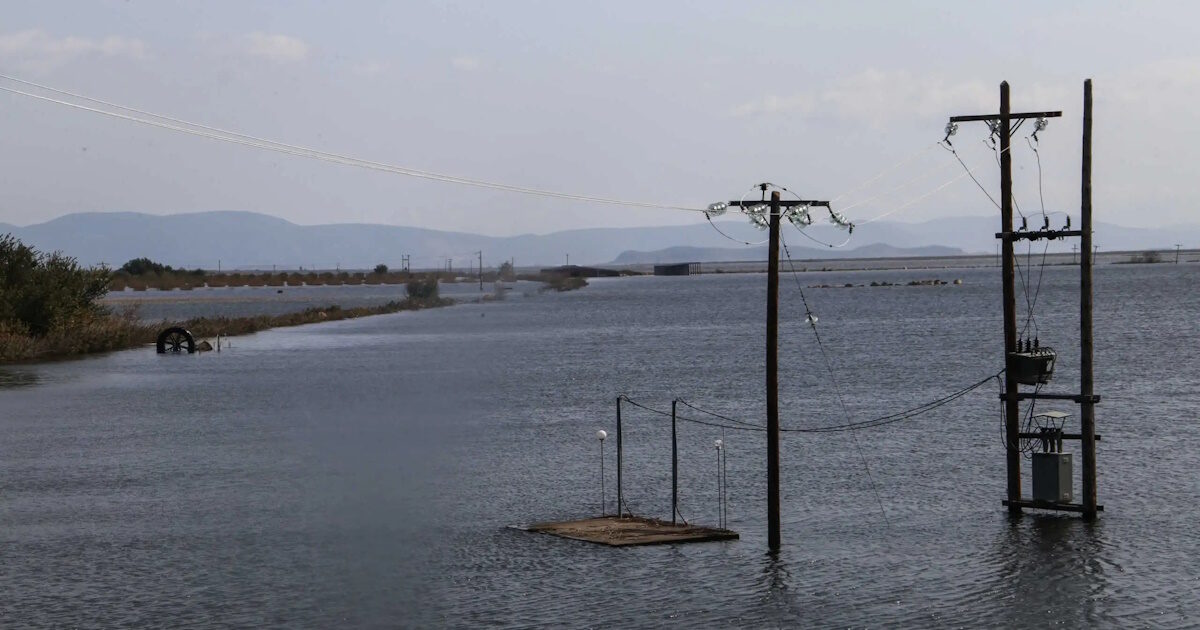Two years after theDaniel”, have not progressed to Thessaly the anti-flood projects that the Government undertook to deliver, according to an announcement by the region of Thessaly.
The Regional Governor Mr. Kouretas points out in all tones that Thessaly today “endures” a Daniel of 12 hours, and this is because the Region proceeded with urgent interventions in streams and torrents. “I am not at all satisfied with the progress of the anti-flood projects that the government has announced so far,” said Mr. Kouretas speaking to the media.
According to the governor of Thessaly, the region can withstand a Daniel of 12 hours. “Then it depends on where he hits. He cannot strike all over Thessaly at the same time. The area can withstand 20 or 24 hours, with the projects we have done. The anti-flood infrastructure projects undertaken by the government have not progressed. Nothing has been done,” he complained.
As Mr. Kouretas said, the restoration projects being carried out in the area are of two levels. “The immediate restoration that was done by us is almost complete and there is also a small piece that will start in the spring of ’26 and be completed by the end of ’27. This concerns the strengthening of the dykes in various places in Pinios and in tributaries of Pinios. So far we have around 150 million euros and another 100 million euros will be needed. Now the system withstands a 12-hour Daniel and when it is completed with the works that will be done until the summer of ’27 by us, we will reach a durability that will reach 60% – 70%”, he repeated.
The projects will not be completed before ’30
Referring to the infrastructure projects, he said that “… the Ministry of Infrastructure has signed with four major companies that started in the summer of ’25 and have a horizon of 48 months to complete. The anti-floods are 200 million, which concern the mountain hydronomy and the three large dams in Pyli, Mouzaki and Enipea. The additional cost is around 1 billion euros. The prime minister told us in August ’24 that the studies would be available in a year. However, we still have nothing. These projects to start need studies, high temperatures, etc. There is no way they will be completed before 2030. Not even a joke. As far as road hydronomy is concerned, it has not been contracted. The pre-studies have been finished, the contractors will come out now, and as far as I know, they will start working from March to April ’26. Because they are small projects, most of them will be completed by the Fall of ’27.’
The water problem of Thessaly has not been solved
According to Mr. Kouretas, despite the great economic, technological and social changes that have taken place in the country, the problem of water security in Thessaly remains unsolved. The risks of repeated floods in the Pinios basin are becoming greater, the problem of security of Thessaly from the effects of drought and water scarcity remains, while in recent decades the ecological destruction caused to aquatic ecosystems has been magnified. “I am now convinced and I state it at every opportunity, that without water there can be no agricultural production and without agricultural production there can be no future for Thessaly, but also for the whole country,” he said. The generative cause was and remains the decades-long extreme mismatch between water demand (mainly for irrigation) and the limited supply of water reserves in Thessaly. Also, the “predatory” exploitation of the underground aquifers with over-pumping from approximately 33,000 wells, are definitely leading the region to desertification”, noted the regional governor.
The most profitable crop, cotton, plummeted due to scarce water. Today only 600,000 acres produce the “white gold”, which is exported to Europe and covers 40% of its needs. Farmers are abandoning cultivation because of the water, while 10 years ago they exceeded 1.5 million hectares.
Thessaly is lost as a rural area
The unfavorable environment for the rural population of the wider area of Thessaly was presented by the Regional Governor of Thessaly, Mr. Dimitris Kouretas, who pointed out that 30% of Thessaly’s GDP comes from agricultural production, noting that without water reserves the area will become deserted and the farmers’ involvement with the land will lead them to crops that do not need water, resulting in a decrease their annual income.
Risk of desertification of the countryside
Mr. Kouretas also referred to the violent restructuring of crops being attempted in Thessaly. As he said, “in recent years, as long as the negative water balance is not addressed, the irrigated areas of Thessaly are decreasing dramatically, while at the same time the agricultural income of the largest and most productive plain of the country is shrinking. All of this has the effect, especially lately, that the debate regarding the type of crops, in the Thessalian plain, has returned. Today’s productive agriculture is at risk of collapse due to lack of irrigation water. Dry crops with an average turnover of 60 – 100 euros per hectare are significantly behind. of the irrigated with 500 euros per hectare. If the water supply is not met, then the irrigated crops will be fatally reduced by 1,000,000 hectares. And the dilemmas multiply given that a possible immediate reduction of irrigated crops in favor of dry land will bring about a simultaneous decrease in turnover by 300-400 million euros per year and a significant decrease in agricultural income by 25%, which today, together with water risks, is a decisive element for these people to stay in their place and for the continuation of the agricultural profession.
